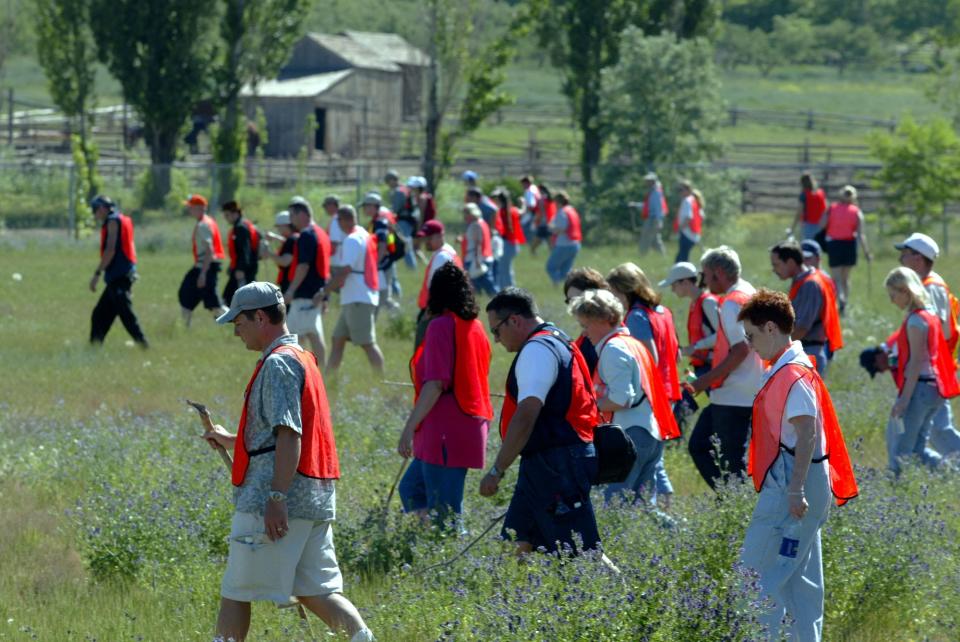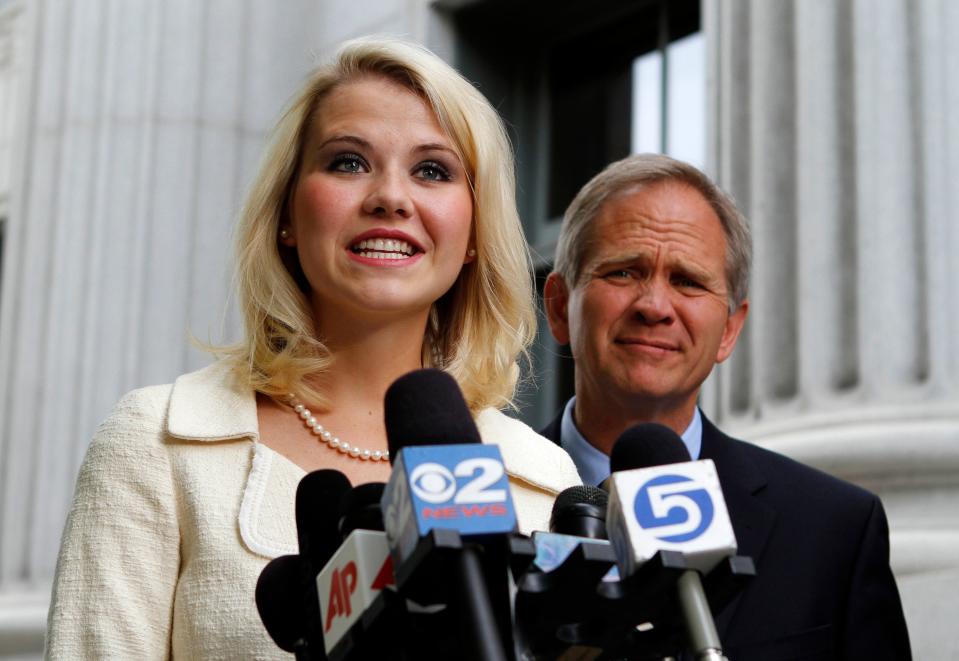Trauma to inspiration: Kidnapping survivor Elizabeth Smart now an advocate

- Oops!Something went wrong.Please try again later.
Moments into a phone interview with Elizabeth Smart, the voice of a young child could be heard in the background.
Coming from one of her three kids, the words faded before offering a glimpse into the child abduction survivor's typical daily routine at her Utah home. One where she works out, reads books and juggles being a wife and mother with advocacy efforts and speaking engagements.
Domestic tranquility is a world away from the severe trauma she endured as a 14-year-old who was abducted at knifepoint from her bedroom in the middle of the night in 2002 at her Salt Lake City home.
For nine months she was missing, held captive at a secret campsite and shackled while being repeatedly raped, abused and threatened.
Her family never gave up hope. Searches took place on land and by air. Police investigated different theories. The case drew intense national media coverage.
Smart's days consisted of boredom, sexual abuse, malnourishment and emotional manipulation. Helicopters flew overhead before disappearing into the distance. During one of the many searches, Smart's uncle called out her name, but Elizabeth couldn't answer back for fear of being killed. Another time, the child and her captors, dressed in long robes under the guise of religious beliefs, eluded the questioning of a police officer in a public library.
Smart gave up hope, expecting never to be found, preparing to die. Then, after the dogged persistence of her family and with the assistance of "America's Most Wanted" television show, the missing child was rescued.
Smart will share that traumatic, inspiring story on Feb. 23 when she speaks at Kent State University at Stark.
A limited number of tickets remained for the event on Friday afternoon, according to the college.
Tickets are free but must be picked up in the Office of Student Services, 132 Main Hall, during the regular business hours of 8 a.m. to 7 p.m. Monday and Tuesday or between 8 a.m. and 5 p.m. on Wednesday through Friday.
Tickets are limited to two per person, and due to the pandemic, seating will be limited, and ticket distribution is first-come, first-serve.
Smart will speak in the Timken Great Hall at the KSU at Stark Conference Center, 6000 Frank Ave. NW. Doors open at 6:45 p.m. Face coverings are required at all times while in the building.
Advocate for child safety
During the roughly 30-minute interview, Smart was fully engaged and impassioned when discussing her role as an advocate for those whom she staunchly refers to as survivors, not victims, of sexual abuse and abduction, as well as human trafficking.
Following Smart's rescue, about eight years passed before she began speaking out. She also waited for the court cases of her abductors, Brian David Mitchell and Wanda Barzee, to be resolved.
"Up until that point, I didn't want to relive it, I didn't want to think about it. I wanted it to almost sink away into just another memory, and I wanted to fill my life with a lot more memories," she said. "I didn't just want (the abduction) to be the only one I thought of."

After meeting with other survivors, and while working on child safety legislation and raising awareness on the subject, Smart said she began to realize her trauma was not unique.
"Growing up, I honestly don't ever remember knowing of someone or hearing about someone who had been sexually abused or who had been kidnapped," she said. "I just didn't know it. But I mean, statistically, nowadays, whether you consciously know or not, you do actually know someone who has or is being sexually abused currently, and that's pretty scary."
Smart has become an advocate for child safety, while promoting recovery programs related to child abduction, as well as having worked with the Department of Justice to create a survivors guide entitled, “You're Not Alone: The Journey From Abduction to Empowerment.”
A message for many
Smart said the reach of her message is broad.
"I don't know anyone actually who hasn't struggled in their life at some point or another," she said. "I mean, we all have struggles, and certainly the last few years, whether it's been through remote learning or loss of income or loss of job or the illness itself.
"... We all experience these hardships, but what I would want people to walk away with, and the audience (and) the students to walk away with from this speech is I know it sounds almost cliché to begin with, but you are special and you are unique, and of everyone else in the entire world, there is only one you and you can never be replaced.
"And then I would want them to know that there is nothing that anyone else can do to you that can take away your value as a human being."

'I see a survivor'
Smart said she's reclaimed her life since the kidnapping.
"There are probably a lot of people who will always think of me as the girl who was kidnapped, and that's OK. I have made peace with that, but I know that does not define me, and if anyone else takes the time to get to know me, I think they'd tell you the same thing.
"... Now I'm a wife and I'm a mom. And I try cooking new food probably three times a week, and let me tell you, I have epic fails. I try baking all the time, and I would say probably one out of every three bakes is good.
"... And when I look into the mirror, I don't just see a victim anymore, I see a survivor, I see someone strong, I see someone who I'm proud to be. And I would just want everyone else to know out there ... whatever you've been through, that does not define who you are — ultimately, you decide who you are."
Being a mother has indelibly changed her perspective on life.
"I think it definitely pushes me to be more vigilant at all times," Smart said. "Knowing where my children are. Making sure that I am having conversations with them about their safety, about what's appropriate behavior, what's not appropriate behavior. What to do if someone is making them feel uncomfortable or unsafe or is threatening them or telling them to keep a secret.
"Those are all red flags ... that we've spoken about and that we continue to speak about, because I don't think it's enough to talk about it once, so certainly (her own experience) pushed me, I think, to be more open with them than I would have."
'We could be doing a much better job'
This June will mark 20 years since Smart's abduction.
"Even to this day, when I go to the grocery store, it's not uncommon to have people approach me and say things like, 'There are two times in my life that I really remember exactly where I was and what I was doing when the news came on. The first one was when JFK was shot, the second one was the day you were rescued and that was one of the happiest days of my life.'
"... Or, 'The two moments are 9/11 and when you were rescued.'"
Smart openly acknowledged that most abduction and missing persons cases receive only a fraction of the media coverage her case attracted.
Based on what she's learned afterward, "I can honestly say I have never seen another case since then with even half as much of coverage as my case got. So I don't think cases get enough attention, and what's even more heartbreaking and sad is that there are so very many, many cases that never even see the light of day.
"Especially children and women and people who are not Caucasian. I mean, their cases, honestly, they're lucky if they even make it in front of a detective.
"And so yes, I think we could be doing a much better job."

'Every victim is someone'
While social media is a tool in child abduction cases, "we have so much information coming at us all the time that if a missing child pops up in front of us, I mean, we might have a momentary ping, but it's quickly replaced by what Meghan Markle is wearing or whatever.
"We just live in an era of massive amounts of information, and I think it's easy for these children to slip out of our minds," Smart said. "And what's so tragic about it is that my parents, they used to say that the worst part of my kidnapping was the not knowing.
In many cases, "the remaining family members or friends, they never find out," she added. "But every victim is someone, and they deserve to be remembered, and their families deserve to know what happened.
"Whether they are killed in the first 48 hours or not, they still deserve to be found, they still deserve to be remembered, and I don't think that we are doing them justice."
Reach Ed at 330-580-8315 and ebalint@gannett.com. On Twitter: @ebalintREP.
This article originally appeared on The Repository: Child abduction survivor Elizabeth Smart turns tragedy into hope

